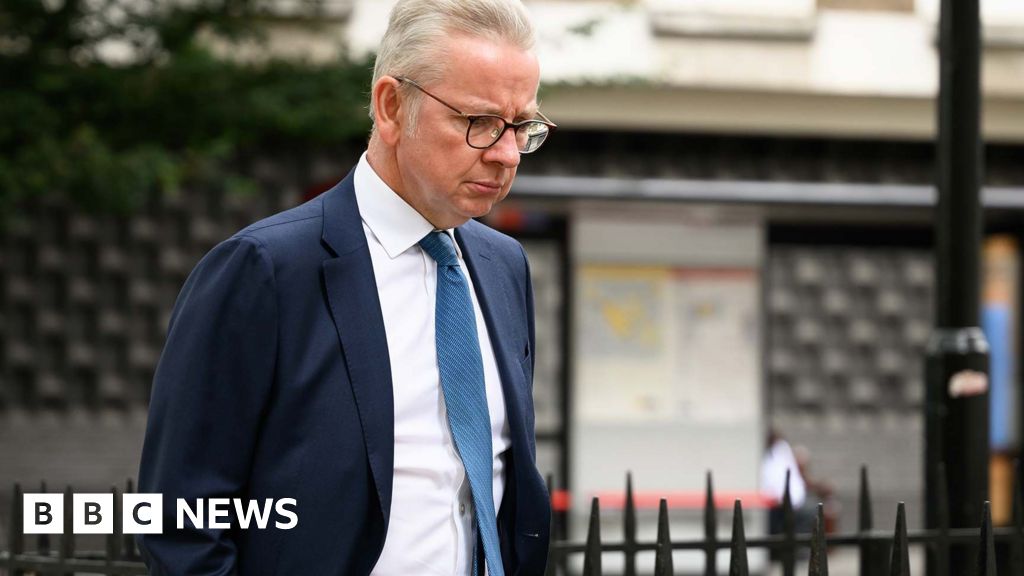Former cabinet minister Lord Michael Gove has apologised on behalf of the then-government and Conservative Party for “mistakes made” during the coronavirus pandemic.
In her long-awaited report published, Baroness Hallett says Boris Johnson, the prime minister at the time, oversaw a “toxic and chaotic” culture in No 10 during Covid.
Lord Gove told the BBC’s Today programme some “attitudes” in Downing Street had been “far from ideal” but added that in a crisis “the business of government can’t be carried out in the manner of a Jane Austen novel”.
He also said an earlier lockdown would have been “wiser” but questioned the report’s assertion that it would have meant fewer deaths.
Responding to the report, Prime Minister Sir Keir Starmer said the government would learn lessons from the report and was already “taking measures to make sure that, not just the NHS but the government as a whole, is prepared for any number of eventualities”.
The 800-page inquiry report is highly critical of government decision-making, and says implementing a Covid lockdown a week earlier could have saved 23,000 lives in the first wave in England – although it does not suggest that the overall death toll would have been reduced.
It also says lockdowns could have been avoided if the government had introduced restrictions such as social distancing earlier and concludes lockdowns “only became inevitable because of the acts and omissions of the four governments” in England, Northern Ireland, Scotland and Wales.
The report describes February 2020 as a “lost month” and says the government’s lack of urgency was “inexcusable”.
It says there was a failure to learn lessons from the first Covid wave and that restrictions in autumn 2020 were introduced too slowly.
At Christmas of the same year, the inquiry argues the governments failed to take action “until infection levels were critical”.
Johnson, who was prime minister between 2019 and 2022 and set up the inquiry, is accused in the report of failing to make decisions quickly enough in autumn 2020 – and of repeatedly changing his mind.
He has been contacted for a comment.
Lord Gove rejected a suggestion that the conclusions of the Covid report would put an end to any future political ambitions Johnson may have.
He said Johnson’s style of decision-making “may not be to everyone’s taste” but added he was “wrestling with an enormously difficult question about the curtailment of liberty and the maintenance of access to healthcare”.
“More than that, without his drive we would not have had his vaccine roll-out that ensured we were the first country to put jabs in arms.”
Dominic Cummings, a senior aide in Downing Street at the time, is singled out for criticism in the report which suggests he displayed “destabilising behaviour” and contributed to a “culture of fear” that “poisoned the atmosphere”.
It also said the loudest voices in government prevailed – and many were ignored “to the detriment of good decision-making”.
Cummings, who left No 10 at the end of 2020, accused the inquiry of enabling “a vast rewriting of history”.
He said it was “important for the public to realise that on most of the big questions, the ‘experts’ including the senior scientists were completely wrong” in the early months of 2020.
Lord Gove said Cummings had been responsible for ensuring data was “accurately and thoroughly interrogated”.
He also said the report noted Cummings’ interventions had been “critical to putting in place the measures necessary to suppress the virus”.
Asked about the culture in Downing Street, he said: “It’s the case that we were dealing with, as everyone in the world was, an unprecedented crisis… and of course, under pressure with imperfect information, mistakes are made, voices are raised.”
Rishi Sunak, who was chancellor during the pandemic, told BBC 5 Live’s Matt Chorley that both the government and scientists had been “operating in a highly uncertain environment”.
“I think we do need to view the decisions taken through that lens, but it’s important that lessons are learned so that we can be better prepared if there’s ever another pandemic.”
Baroness Hallett also criticised Sir Chris Wormald – he is currently the cabinet secretary, the most senior civil servant in the government, but during the pandemic was the permanent secretary at the health department.
She said he had failed to take action to “rectify the overenthusiastic impression” given by then-Health Secretary Matt Hancock about the ability of the department to deal with the pandemic.
Asked on Radio 4’s Today programme, if Sir Chris should stay in his job, given the report’s criticism, Science Secretary Liz Kendall said “yes” adding that he was doing “excellent work across government including learning the lessons from this pandemic”.
Source link : https://www.bbc.com/news/articles/c9qeglxwwx7o?at_medium=RSS&at_campaign=rss
Author :
Publish date : 2025-11-21 12:58:00
Copyright for syndicated content belongs to the linked Source.
